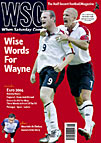 Daunis Auers was among the Latvia fans following their team of outsiders around Portugal. They might have even stayed a little longer but for a crucial decision by an English referee…
Daunis Auers was among the Latvia fans following their team of outsiders around Portugal. They might have even stayed a little longer but for a crucial decision by an English referee…
Euro 2004 arrived suddenly and unexpectedly in Latvia. About two weeks before the tournament, the local media began running stories on the national team. They followed the training regime of the players, reported on their choice of cars (Simon Jordan will be pained to hear that the two ex-Crystal Palace players had the nicest ones) and even ran features on the players’ wives.